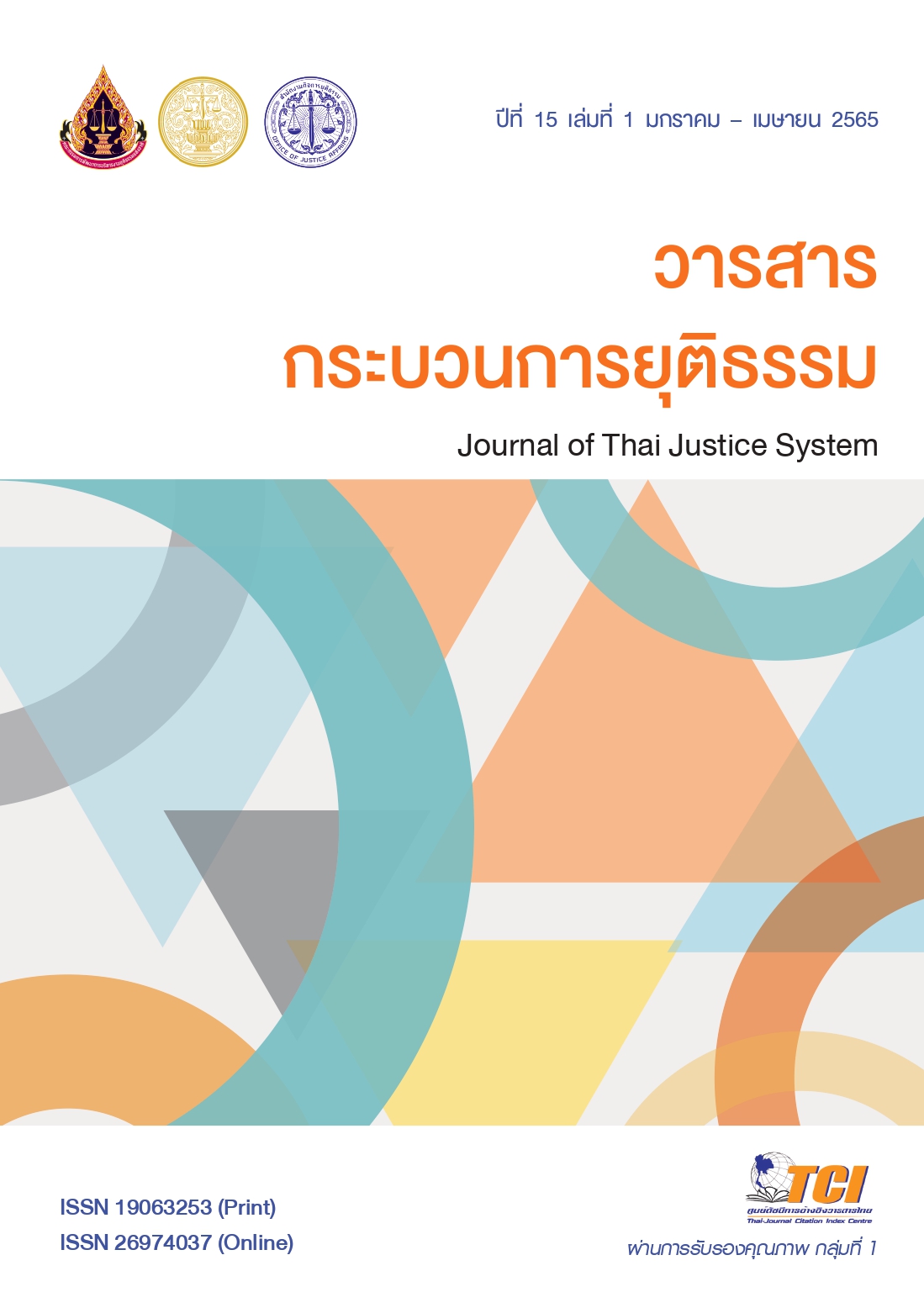การคุ้มครองสิทธิของผู้เสียหายจากกรณีการเผยแพร่ภาพอนาจารส่วนบุคคลโดยปราศจากความยินยอม
Main Article Content
บทคัดย่อ
บทความวิจัยนี้มีวัตถุประสงค์เพื่อศึกษาการคุ้มครองผู้เสียหายจากกรณีการเผยแพร่ภาพอนาจารส่วนบุคคลโดยปราศจากความยินยอม การวิเคราะห์และศึกษาเปรียบเทียบเกี่ยวกับการบังคับใช้กฎหมายในต่างประเทศ เพื่อหาข้อเสนอแนะและแนวทางการใช้บังคับกฎหมายของประเทศไทยได้อย่างมีประสิทธิภาพ สำหรับระเบียบวิธีการวิจัยเป็นการวิจัยเชิงคุณภาพ (qualitative research) โดยใช้วิธีการวิจัยจากเอกสาร (documentary research) โดยศึกษาค้นคว้าจากตำรา หนังสือ บทความ วิทยานิพนธ์ วารสาร ทฤษฎีและหลักกฎหมายตลอดจนกรณีศึกษา เอกสารอิเล็กทรอนิกส์ เป็นต้น
จากการศึกษาวิจัยกฎหมายของประเทศสหรัฐอเมริกามลรัฐอิลลินอยส์ ที่มีชื่อว่า พระราชบัญญัติว่าด้วยการเยียวยาความเสียหายทางแพ่งสำหรับการเผยแพร่ภาพอนาจารส่วนบุคคลโดยปราศจากความยินยอมปีค.ศ. 2020 (Civil Remedies for Nonconsensual Dissemination of Private Sexual Images Act) มีบทบัญญัติคำนิยาม ลักษณะการกระทำ การเรียกร้องค่าเสียหาย การเรียกค่าสินไหมทดแทนเชิงลงโทษการคุ้มครองสิทธิผู้เสียหาย และการดำเนินคดีที่แตกต่างจากกฎหมายของประเทศไทย กฎหมายที่มีอยู่ในประเทศไทยในขณะนี้ยังไม่สามารถคุ้มครองสิทธิของผู้เสียหายกรณีดังกล่าวได้อย่างมีประสิทธิภาพ
การวิจัยมีข้อเสนอแนะทางกฎหมายด้วยการปรับปรุงแก้ไขเพิ่มเติมกฎหมายที่เกี่ยวกับข้องเรื่องความเสียหายทางจิตใจ การชดใช้ค่าสินไหมทดแทน การดำเนินคดีทางแพ่งที่ผู้เสียหายสามารถใช้นามแฝงได้ อายุความในการดำเนินคดี เป็นต้น เพื่อคุ้มครองสิทธิของผู้เสียหายที่ถูกกระทำในลักษณะดังกล่าวให้ได้รับความคุ้มครองทางกฎหมาย รวมถึงให้เกิดประสิทธิภาพในการป้องกันคุ้มครองผู้เสียหายจากการกระทำความผิดและเป็นประโยชน์แก่สังคมไทยต่อไป
Article Details

อนุญาตภายใต้เงื่อนไข Creative Commons Attribution-NonCommercial-NoDerivatives 4.0 International License.
ต้นฉบับที่ได้รับการตีพิมพ์ในวารสาร เป็นลิขสิทธิ์ของวารสารกระบวนการยุติธรรม แต่ความคิดเห็นที่ปรากฏในเนื้อหาของบทความในวารสารกระบวนการยุติธรรม ถือเป็นความรับผิดชอบของผู้เขียนแต่เพียงผู้เดียว
เอกสารอ้างอิง
จักรินทร์ โกเมศ. (2555). ค่าเสียหายสำหรับความเสียหายทางจิตใจตามกฎหมายลักษณะละเมิด. วารสารกระบวนการยุติธรรม, 5(1), 79-87.
จี๊ด เศรษฐบุตร. (2550). หลักกฎหมายแพ่งลักษณะละเมิด. กรุงเทพฯ: มหาวิทยาลัยธรรมศาสตร์.
จิตติ ติงศภัทิย์. (2555). คำอธิบายประมวลกฎหมายแพ่งและพาณิชย์ เรียงมาตราว่าด้วยจัดการงานนอกสั่งลาภมิควรได้ ละเมิด บรรพ 2 มาตรา 395-452. กรุงเทพฯ: มหาวิทยาลัยธรรมศาสตร์.
ณัฐพันธุ์ เบ็ญขันธ์. (2563). ปัญหาทางกฎหมายในการกำหนดความรับผิดทางอาญาของผู้เผยแพร่ภาพอนาจารส่วนตัวของผู้อื่นโดยปราศจากความยินยอม, วารสารวิจัยรำไพพรรณี, 14(2), 125-134.
ธีรัจฉรา บวรนันทกุล. (2563). ปัญหาเกี่ยวกับการกำหนดค่าเสียหายสำหรับความเสียหายต่อจิตใจตามกฎหมาย ว่าด้วยความรับผิดในสินค้าที่ไม่ปลอดภัย. วารสารสังคมศาสตร์บูรณาการ, 7(2), 183-202.
เพ็ง เพ็งนิติ. (2560). ประมวลกฎหมายแพ่งและพาณิชย์ว่าด้วย ละเมิด และสรุปหลัก พ.ร.บ.ความรับผิดทางละเมิดของเจ้าหน้าที่ (พิมพ์ครั้งที่ 10). กรุงเทพฯ: สำนักพิมพ์สำนักอบรมศึกษากฎหมายแห่งเนติบัณฑิตยสภา.
ไพจิตร ปุญญพันธุ์. (2538). คำอธิบายประมวลกฎหมายแพ่งและพาณิชย์ลักษณะละเมิด (พิมพ์ครั้งที่ 7). กรุงเทพฯ: นิติบรรณาการ.
ศนันท์กรณ์ โสติพันธุ์. (2560). คำอธิบายกฎหมายลักษณะละเมิด จัดการงานนอกสั่ง และลาภมิควรได้ (พิมพ์ครั้งที่ 7). กรุงเทพฯ: วิญญูชน.
สาวตรี สุขศรี. (2563). กฎหมายว่าด้วยอาชญากรรมคอมพิวเตอร์และอาชญากรรมไซเบอร์ (พิมพ์ครั้งที่ 2). กรุงเทพฯ: มหาวิทยาลัยธรรมศาสตร์.
Beyens, J., & Lievens, E. (2016). A legal perspective on the non-consensual dissemination of sexual images: Identifying strengths and weaknesses of legislation in the US, UK and Belgium. International Journal of Law, Crime and Justice, 47, 31-43.
Evans, M. (2018). Regulating the non-consensual sharing of intimate images ('Revenge Pornography') Via a Civil Penalty Regime: a Sex Equality Analysis. Monash University Law Review, 44(3), 602-620.
Gabriel, K. (2020). FEMINIST REVENGE: SEEKING JUSTICE FOR VICTIMS OF NONCONSENSUAL PORNOGRAPHY THROUGH "REVENGE PORN" REFORM. Vermont Law Review, 44(4), 849-892.
Hall, M., & Hearn, J. (2019). Revenge pornography and manhood acts: A discourse analysis of perpetrators' accounts. Journal of Gender Studies, 28(2), 158-170.
Magaldi, J. A., Sales, J. S., & Paul, J. (2020). Revenge porn: The name doesn't do nonconsensual pornography justice and the remedies don't offer the victims enough justice. Oregon Law Review, 98(1), 197-228.
Rosenberg, R., & Dancig-Rosenberg, H. (2021). Recon centralizing revenge porn. Arizona Law Review, 63(1), 199-228.
ŠEpec, M., & Lango, M. (2020). Virtual revenge pornography as a new online threat to sexual integrity. Balkan Social Science Review, 15(15), 117-133.


